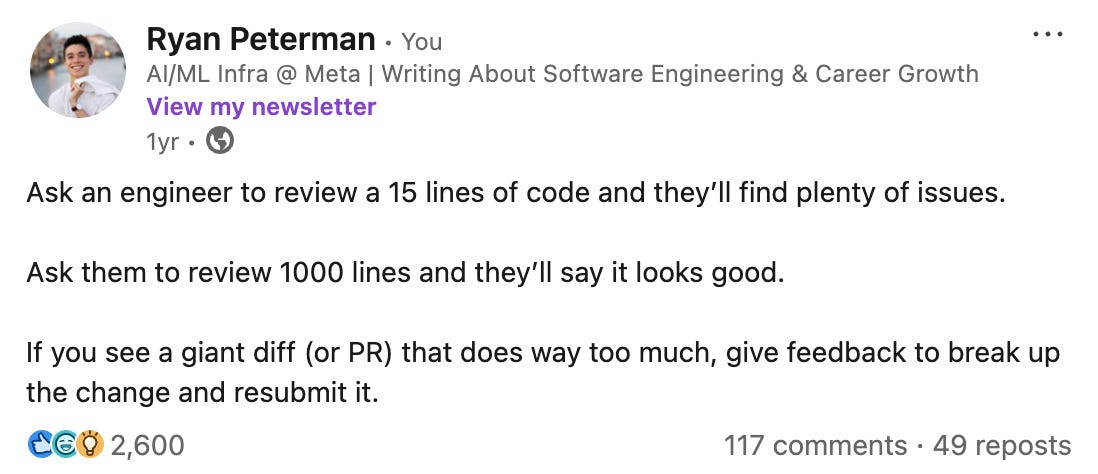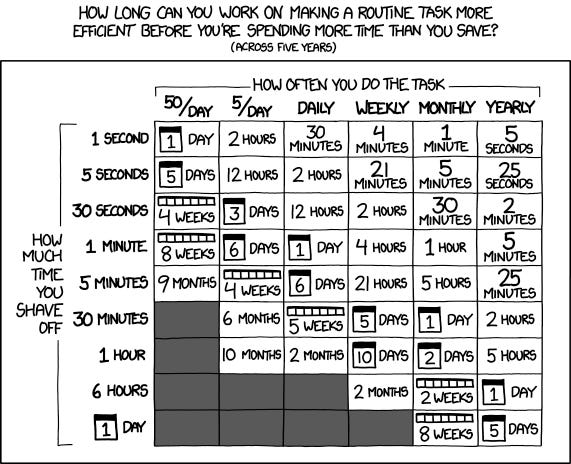Everything I Know About Shipping Code Faster
Two weeks ago, I shared Evan’s writing on what helped him grow from Junior to Staff at Meta in 3 years. His entire post hinges on that you need to blaze through your core responsibilities to free up time for growth. The most common question I got after that post was how do you do that? I interviewed Evan last week so you can hear the answer in his own words soon (aiming to share that next week). Before that, I wanted to share some thoughts since it’s one of the most important parts of growing your impact. Here’s everything I know about shipping more in less time. Resolving AmbiguityBefore you start writing code, you need to figure out what changes to make and where to make them. If you want to do this fast, you need to:
Writing Code FasterOne of the most important parts of churning out code fast is to write smaller, focused diffs. As your code changes get larger, the time to write, test, review, and merge them in goes up exponentially. Not to mention that the chance of catching bugs is much lower: Once you get into a habit of writing small, encapsulated diffs you’ll find that proving your code works can actually take longer than writing it. There are three tactics that helped me test my code faster:
Faster Code ReviewsOnce I was fast at writing code, I was landing an average of five code changes per day to prod. After 1000+ commits, I learned that the bottleneck in landing code faster was no longer in writing and testing it. My bottleneck became waiting on code reviews. There are two ways to get code reviewed faster:
Writing software is social. You need to know how to smoothly cooperate with people and request review from them. If you’re a good collaborator, you’ll build trust so that people review your code faster. Aside from that, it’s also often helpful to educate people on what you’re working on. The most effective way I found to do that was by writing clear descriptions for each of my code changes. That way anyone who saw it could understand what I was doing and why I was doing it enough to review it. Maintain Flow StateWriting code requires deep focus since you need to juggle a lot of context. How deep in the call stack are you? What other code references your code? Getting all that loaded into your brain's working memory takes time. Every interruption makes you pay that cost again. Therefore, reducing unnecessary distractions is one of the most impactful things you could do to be more productive. Thankfully, there’s a lot of tactics to preserving your flow state:
Optimizing Your WorkflowThere are also often technical solutions to getting work done faster. I’d recommend you audit your workflow and see what you’re waiting on (e.g. builds, tests, queries). Slow parts of your workflow are often opportunities to make tools that help you move faster. The added benefit of building technical solutions is you can share these tools with others for leveraged impact. No matter how much you optimize your workflow, there will always be some waiting. For those small fragments of time you should see if there are some tiny things you can get to. For me this meant cleaning up the code, replying to pings, or querying data. Whatever it is though, you shouldn’t just sit there while you’re waiting for builds. That time adds up and you can get much more done by interleaving small tasks while you wait. If you do this right, you’ll free up that extra 30% time to enable the career growth that Evan talked about. I had a similar experience to him, but one other thing I did was work more hours. I enjoyed my work enough that I was probably averaging a natural extra 30% of work time. Coupling that with being more efficient helped me pursue many parallel growth opportunities. I hope this was helpful, and look out for the conversation with Evan. We thought it’d be interesting to compare and contrast our paths to Staff at Meta in 3 years. He had a lot of interesting stories to share that he hasn’t talked about anywhere else yet. If you’re interested you can sub to my YouTube to make sure you get it as soon as it’s available. It’ll also be available wherever you get your podcasts: Thanks for reading, |
Similar newsletters
There are other similar shared emails that you might be interested in:


